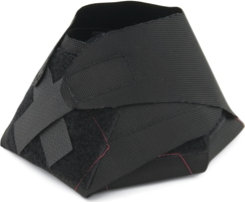The only experience I have had with horses and severe neurological disease was with a horse brought into the stables I was managing, and while in quarantine the horse became symptomatic for and diagnosed with West Nile Virus (WNV). This was around 2004 when WNV was spreading throughout the southern United States.
This particular horse, a flea bitten colored grade gelding, was not in the best condition coming into quarantine as he was bought from the local horse auction where most of the horses went to the killer market. After several days in quarantine this horse started showing signs of severe lethargy, walking stiff and having balance problems. Almost falling over when he tried to turn around. This makes you heart sick to see a horse in this condition.
Other symptoms of West Nile could have included: muscle twitches or tremors; behavior that appears to be depression - pushing head into a wall or fence; tongue sticking out seemingly paralyzed.
We got a Vet in to take blood and it was confirmed that the horse has WNV. We weren't too worried about infection of the horses in the main barn since WNV is transmitted by mosquitoes, with symptoms appearing in a horse 5 days to two weeks from when bitten/infected and the barn was mosquitoe free. I also had bug people from the hospital set traps just to make sure. Plus WNV cannot be transmitted from one horse to another. Still, the fact that our quaratine was 300 yards or more from the main barn and arenas was comforting.
So the only thing we could do was provide supportive care....Bute, Banamine, and placing water buckets at various levels so the horse could drink easier. I also put bucket loads of sand in a quarantine stall we moved him to in case he fell over, which would not be uncommon to a WNV positive horse.
This horse actually recovered. I hauled him to a family with two young boys who adopted him and were eventually team roping off of this gelding. There is a even chance this horse can live asympamatic the rest of his life.
This bulletin, below, came from Western Horseman advertising a television presentation on Equine Neurological Diseases. You can receive e-mail notifications from Western Horseman as well through contacting Western Horseman at info@mktg.westernhorseman.com
Equine neurological diseases have been on the rise over the last few years. Last year, 618 equine cases of WNV were reported, up from 87 in 2011. And in 2011 the infamous EHV-1 outbreak that started in Utah caused significant nationwide concern. Do you know the signs or what to look for if you suspect your horse may be affected? Join us for a one-hour presentation on what you can do to protect your horse from these devastating diseases.
Neurological Diseases: How to protect your horse. On RFD-TV • Monday, April 15, 2013 • 8 p.m. ET.
The show will be broadcast live from Equine Sports Medicine and Surgery in Weatherford, TX with an in-studio audience. Our experts will discuss:
• Preventing horses from contracting WNV
• Importance of biosecurity to protect against EHV-1
• Diagnosing signs and risk factors of EPM
• Additional neurological diseases
Sponsored by Merck Animal Health, the show features leading experts to answer questions from the studio audience, including:
Joe Manning, D.V.M., M.B.A. Equine Technical Services Veterinarian, Merck Animal Health
Chris Ray, D.V.M., Dipl. ACVS Owning Partner, Equine Sports Medicine and Surgery
and, Reese Hand, D.V.M., Dipl. ACVS Associate, Equine Sports Medicine and Surgery



















No comments:
Post a Comment